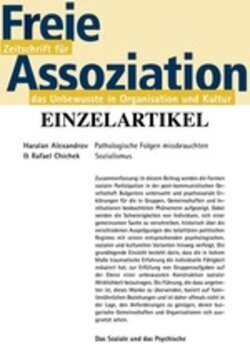19 Seiten, PDF-E-Book
Erschienen: November 2007
Bestell-Nr.: 21086
abonnieren
Haralan Alexandrov & Rafael Chichek
Pathologische Folgen missbrauchten Sozialismus (PDF)
Freie Assoziation 2007, 10(3), 55-73
Sofortdownload
Dies ist ein E-Book. Unsere E-Books sind mit einem personalisierten Wasserzeichen versehen,
jedoch frei von weiteren technischen Schutzmaßnahmen (»DRM«).
Erfahren Sie hier mehr zu den Datei-Formaten.
Formen sozialer Partizipation in der postkommunistischen Gesellschaft Bulgariens werden untersucht und psychosoziale Erklärungen für die in Gruppen, Gemeinschaften und Institutionen beobachteten Phänomene werden aufgezeigt. Dabei werden die Schwierigkeiten von Individuen, sich einer gemeinsamen Sache zu verschreiben, historisch über die verschiedenen Ausprägungen des totalitären politischen Regimes mit seinen entsprechenden psychologischen, sozialen und kulturellen Varianten hinweg verfolgt. Die grundlegende Einsicht besteht darin, dass die in hohem Maße traumatische Erfahrung die individuelle Fähigkeit reduziert hat, zur Erfüllung von Gruppenaufgaben auf der Ebene einer unbewussten Konstruktion sozialer Wirklichkeit beizutragen. Die Führung, die dazu angetreten ist, dieses Manko zu überwinden, basiert auf familienähnlichen Beziehungen und ist daher oftmals nicht in der Lage, den Anforderungen zu genügen, denen bulgarische Gemeinschaften und Organisationen sich ausgesetzt sehen.
Abstract:
This paper explores the modes of social participation in Bulgarian post communist society and suggests psycho social explanation for the observed phenomena in groups, communities and institutions. The difficulties encountered by individuals to genuinely commit to communal causes are traced historically through the different modifications of the totalitarian political regime with the respective psychological, social and cultural ramifications. The key finding is that the massive traumatic experience has injured the individual capacity to contribute to group tasks at the level of unconscious construction of social relations. The leadership invited to heal it is based on family type of relation and often is not adequate to the challenges Bulgarian groups, communities and organizations are called to face.
Stichworte: Sozialismus, Trauma, Partizipation, Politische Partizipation, Totalitarismus, Führung
Keywords: Socialism, Trauma, Participation, Political Participation, Totalitarianism, Leadership
Abstract:
This paper explores the modes of social participation in Bulgarian post communist society and suggests psycho social explanation for the observed phenomena in groups, communities and institutions. The difficulties encountered by individuals to genuinely commit to communal causes are traced historically through the different modifications of the totalitarian political regime with the respective psychological, social and cultural ramifications. The key finding is that the massive traumatic experience has injured the individual capacity to contribute to group tasks at the level of unconscious construction of social relations. The leadership invited to heal it is based on family type of relation and often is not adequate to the challenges Bulgarian groups, communities and organizations are called to face.
Stichworte: Sozialismus, Trauma, Partizipation, Politische Partizipation, Totalitarismus, Führung
Keywords: Socialism, Trauma, Participation, Political Participation, Totalitarianism, Leadership
Rose Redding MerskyS. 7–27Lost in Transition: Eine psychoanalytische Untersuchung zur Objektbindung in heutigen post-modernen Organisationen (PDF)
Freie Assoziation 2007, 10(3), 7-27Howard F. SteinS. 29–54Organisatorischer Totalitarismus und Dissens (PDF)
Freie Assoziation 2007, 10(3), 29-54Haralan Alexandrov & Rafael Chichek S. 55–73Pathologische Folgen missbrauchten Sozialismus (PDF)
Freie Assoziation 2007, 10(3), 55-73Lothar MalkwitzS. 75–87Führung, Verführung und Todesangst - Eine theologische-psychoanalytische Etüde zu R.W. Bion (PDF)
Freie Assoziation 2007, 10(3), 75-87Rupert MartinS. 89–102Good Bye, Lenin! (PDF)
Freie Assoziation 2007, 10(3), 89-102Tomas PlänkersS. 103–114Der erste Kaiser und der letzte Parteichef. Der Film »Hero« (Zhang Yimou 2002) und seine gegenwärtige Bedeutung im innerchinesischen Diskurs (PDF)
Freie Assoziation 2007, 10(3), 103-114
Freie Assoziation 2007, 10(3), 7-27Howard F. SteinS. 29–54Organisatorischer Totalitarismus und Dissens (PDF)
Freie Assoziation 2007, 10(3), 29-54Haralan Alexandrov & Rafael Chichek S. 55–73Pathologische Folgen missbrauchten Sozialismus (PDF)
Freie Assoziation 2007, 10(3), 55-73Lothar MalkwitzS. 75–87Führung, Verführung und Todesangst - Eine theologische-psychoanalytische Etüde zu R.W. Bion (PDF)
Freie Assoziation 2007, 10(3), 75-87Rupert MartinS. 89–102Good Bye, Lenin! (PDF)
Freie Assoziation 2007, 10(3), 89-102Tomas PlänkersS. 103–114Der erste Kaiser und der letzte Parteichef. Der Film »Hero« (Zhang Yimou 2002) und seine gegenwärtige Bedeutung im innerchinesischen Diskurs (PDF)
Freie Assoziation 2007, 10(3), 103-114

